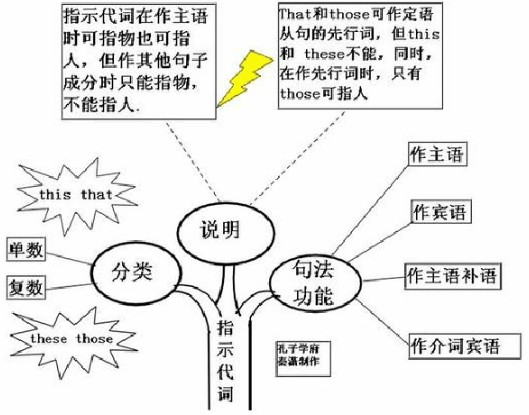本试题 “Thinking________you know _________in fact you don't is a terrible mistake.[ ]A. what; whatB. that; whatC. what; thatD. that; that” 主要考查您对指示代词
连接代词
等考点的理解。关于这些考点您可以点击下面的选项卡查看详细档案。
- 指示代词
- 连接代词
指示代词的概念:
指示代词是表示指示概念的代词,即用来指示或标识人或事物的代词。主要有this,that,these,those。
this和that用于指代单数,these和those用于指代复数。
指示 代词与定冠词和人称代词一样,都具有指定的含义,用来起指示作用,或用来代替前面已
提到过的名词。
指示代词具有名词和形容词的性质,在句中作主语、宾语、表语、定于等。
指示代词的用法:
指示代词(this, that, these, those)在句中可作主语、宾语、表语、定语:
This is yours and that is mine. 这是你的,那是我的。
I want this book, not that book. 我要这本书,不是那本书。
I like these and he likes those. 我喜欢这些,他喜欢那些。
These computers are cheap. 这些电脑便宜些。
What I want to say is this. 我想说的就是这点。
注:指示代词用作主语和定语时,可指人或物;用作宾语和表语时,只指物。如 This is my father. this 在句中作主语,可以指人,但是在 Do you know this?中,this作宾语,此句只能理解为“你知道这个情况吗?”不能理解为“你认识这个人吗?”
指示代词this与that用法比较:
(1)用来回指上文提到的事情时,可用 this 或 that,但是若要指下文叙述的事情,通常要用 this:
She married Jim, and this[that]surprised me. 她嫁给了吉姆,这使我感到很吃惊。
I want to know this: Is he healthy? 我想知道这一点:他是否很健康。
注:回指上文的that在译成汉语时,通常却译为“这”: That's where you are wrong. 这就是你不对的地方。
(2)在打电话时,通常用 this 指自己,用 that 指对方:
Hello. This is Jim. Is that John? 喂,我是吉姆,你是约翰吗? 但在美国英语中指对方时也可用this。
(3)除用作代词外,this 和that 都可用作副词,与形容词或副词连用,其义为“这么”、“那么(=so):
It's about this(that )high. 大约这(那)么高。
Is it this hot every day? 每天都有这么热吗?
指示代词用法特别提示:
1、this (these)与that (those):
this(these)指近的事物,that(those)指远的事物,可以指空间的远近,时间的前后以及叙述事物的先后。
如:This is a new book. That is an old one. 这是一本新书,那是一本旧书。
2、such与same:
前者表示“如此、这样的人或事”,“后者表示同样的人或事”。在句中常用作主语或宾语。
如:Such was Einstein, asimple man of great achievements. 爱因斯坦就是这样一个人,朴实无华,成就非凡。
Read the stories such as you love. 读你喜欢的故事吧。
The same is the case with everyone. 大家的情况也是一样。
指示代词知识体系:

指示代词用法拓展:
1、注意以下各句中this的特殊用法:
如:He will be in Paris this day next week.下个星期的今天他将在巴黎了。
He will come here this day next month.他将在下个月的今天来这儿。
比较:He got married ten years ago today. 他是10年前的今天结婚的。
2、表替代的that与those:
有时为了避免重复,可用that和those 代替前面提到的名词:
如:The population of China is much larger that that of Japan.中国人口比日本人口多得多。(that=the population)
His views are close to those of the Socialist Party. 他的观点接近社会党的观点。(those=the views)
连接代词的概念:
连接代词常用来引导一个主语从句、宾语从句和表语从句,在句中可用作主语、宾语、表语、定语等,连接代词主要包括who, whom, what, which, whose, whoever, whatever, whichever, whosever等。
whatever, whoever, whichever 用法说明:
主要用于引导主语从句和宾语从句。
如:He does whatever she asks him to do. 她要他做什么,他就做什么。
Whoever breaks the rules will be punished.谁违反这些规则都将受到处罚。
I'll give the ticket to whoever want sit. 请想要这票,我就把它给谁。
Whichever team gains the most points wins. 哪个队得分最多,哪个队就赢。
注:其中的ever主要用于加强语气,含有“一切”、“任何”、“无论”之义。使用这类词时,注意不要按汉语习惯用错句子结构:
如:任何人(谁)先来都可以得到一张票。
误:Anyone comes first can get a ticket./ Who comes first can get a ticket.
正:Anyone who comes first can get a ticket./ Whoever comes first can get a ticket.
连接代词的用法:
1、连接代词主要包括who, whom, what, which, whose, whoever, whatever, whichever, whosever等,它们在句中可用作主语、宾语、表语、定语等,可以引导主语从句、宾语从句和表语从句:
如:I don't know who he is. 我不知道他是谁。
What he says sounds reasonable. 他说的话听起来很有道理。
The question is who(m) we should trust. 问题是我们该信任谁。
I'll take whoever wants to go. 谁想去我就带谁去。
Take whichever seat you like? 你喜欢坐哪个座位就坐哪个?
I will just say whatever comes into my mind. 我想到什么就说什么。
注:who, whom, whoever等不用于名词前作定语。
2、what的两种用法。请看以下两个句子:
(1)I didn't know what he wanted. 我不知道他想要什么。
(2)I gave her what she wanted. 我给了她想要的一切。
上面第一句中的what表示“什么”,带有疑问的意味;第二句中的what表示“所…的一切事或东西”,其意义上大致相当于that(those) which, the thing(things) that, anything that, all that, as much as等,又如:
What[=That which] you say is quite true. 你说的完全是事实。
He saves what[=all that] he earns. 他赚多少,积蓄多少。
Call it what[=anything that] you please. 你喜欢叫它什么就叫它什么。
这样用的what有时还可后接一个名词:
如:He gave me what money[=all the money that] he had about him. 他把身边带有的钱全给了我。
What friends[=All the friends that] he has are out of the country. 他所有的朋友都在国外。
连接代词知识体系:

whatever, whoever, whichever 用法说明:
主要用于引导主语从句和宾语从句。
如:He does whatever she asks him to do. 她要他做什么,他就做什么。
Whoever breaks the rules will be punished.谁违反这些规则都将受到处罚。
I'll give the ticket to whoever want sit. 请想要这票,我就把它给谁。
Whichever team gains the most points wins. 哪个队得分最多,哪个队就赢。
注:其中的ever主要用于加强语气,含有“一切”、“任何”、“无论”之义。使用这类词时,注意不要按汉语习惯用错句子结构:
如:任何人(谁)先来都可以得到一张票。
误:Anyone comes first can get a ticket./ Who comes first can get a ticket.
正:Anyone who comes first can get a ticket./ Whoever comes first can get a ticket.
与“Thinking________you know _________in fact you don't is a ...”考查相似的试题有:
- The number of players in this year's sports meet was half ______.[ ]A. last year'sB. that of last year'sC. of last ye...
- — He was nearly killed in a car accident the other day.— Oh, when was ________ exactly?— It was on April 28 ________ ...
- The information on the Internet gets around much more rapidly than _____ in the newspaper.A. itB. thatC. oneD. the one
- 短文改错。假定英语课上老师要求同桌之间交换修改作文,请你修改你同桌写的以下作文。文中共有10处语言错误,每句中最多有两...
- It is by no means clear________ the president can do to end the strike.[ ]A. howB. whichC. thatD. what
- After walking for ____ seemed like hours, we finally reached the village.[ ]A. thatB. whatC. whenD. which.
- The headmaster decided to give the job to ________ he believed had a strong sense of duty.[ ]A. whoB. whomeverC. whoe...
- If one has never tasted bitter, he or she does not understand _____ is sweet.[ ]A. thatB. whichC. whoD. what
- ____ team wins on Saturday will go through to the national championships.A. No matter whatB. No matter whichC. Whatev...
- The output of the gold mine is now four times _____ it was before liberation.[ ]A. thatB. whatC. whichD. than